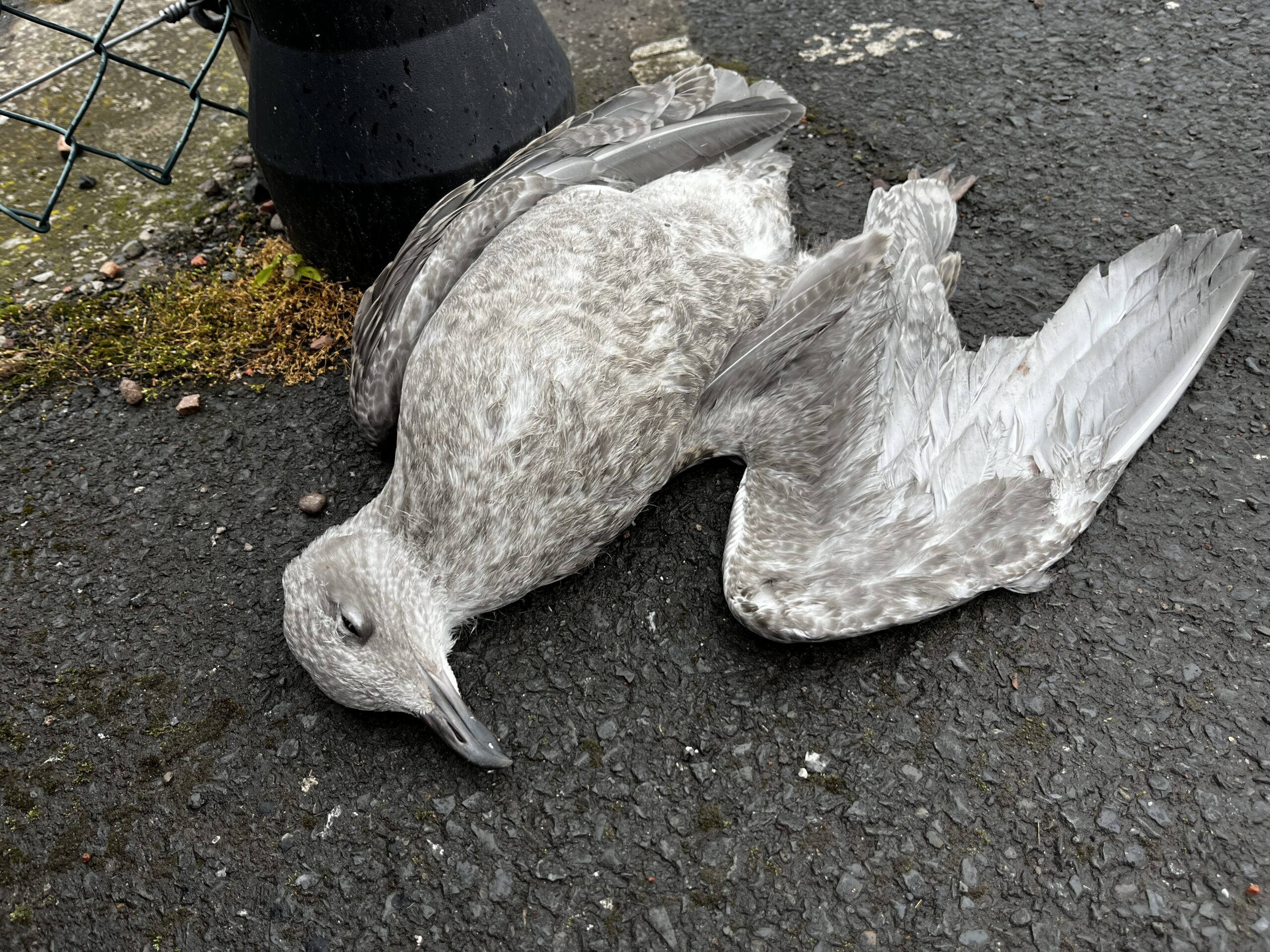Urban gulls shift the timing of foraging behaviour based on human activities, so when food resources become locally abundant, these resourceful feathered beasts fly and feed.1 Other studies show that landfill gulls are possibly a bit lazier, as time budgets shows them sitting around for much longer periods rather than flying, at least when compared with those that use agricultural fields who do a lot more walking. We can guess why. I wonder also if landfill and urban gulls at at risk from a poor diet and lifestyle problems, a bit like us? We asked a friend:

Are urban gulls at at risk from a poor diet and lifestyle problems?
Urban gulls, including those that forage at landfills, do face health issues linked to their diet, which can mirror the negative effects of junk food consumption in humans. Here are some key points from the scientific literature and observations:
- Botulism and Other Diseases: Gulls feeding at landfills are at risk of botulism, a serious and often fatal illness caused by toxins produced by the bacterium Clostridium botulinum. This bacterium can thrive in the anaerobic conditions of rotting organic matter, which is common in landfills. Cases of botulism outbreaks among gulls and other birds at landfills have been documented, indicating a significant health risk from this food source (BioMed Central) (SpringerLink).
- Poor Nutritional Value: The diet available at landfills and urban environments is often nutritionally poor, consisting mainly of discarded human food, which lacks the necessary nutrients for optimal bird health. This poor diet can lead to malnutrition, weakened immune systems, and increased susceptibility to diseases and parasites (BioMed Central).
- Chemical Contaminants: Landfills can be a source of various chemical contaminants, including heavy metals and persistent organic pollutants (POPs), which can accumulate in the bodies of gulls. These contaminants can cause a range of health issues, including reproductive problems, endocrine disruption, and liver damage (SpringerLink).
- Behavioral and Physiological Changes: Gulls that rely heavily on anthropogenic food sources may exhibit changes in behavior and physiology. For example, they may become more aggressive or develop dependency on human-provided food. Additionally, such diets can lead to obesity and other metabolic disorders, similar to the effects of junk food on humans (BioMed Central) (SpringerLink).
- Impact on Reproductive Success: Poor diet quality can affect the reproductive success of gulls. Nutrient deficiencies can lead to lower egg quality, reduced hatching success, and higher chick mortality. This has long-term implications for population stability and growth .
Conclusion
The evidence strongly suggests that urban gulls, particularly those feeding at landfills, suffer from a range of health problems due to their poor diet. These issues are analogous to the negative effects of junk food consumption in humans, including increased disease risk, nutritional deficiencies, and potential behavioral changes. Effective waste management and urban planning strategies are essential to mitigate these impacts on gull populations.
Our local landfill, this side of Skateraw, is an important feeding station and roost. But am I alone in wondering what is going to happen in 2025? Our local landfill is slated to close for municipal waste as the Scottish Government has already reluctantly extended the ban from 20212. If it closes, and to be honest that cannot happen too soon, an important feeding and resting site is going to displace hundreds of birds. Who knows or cares just how many will find a new home in Dunbar and neighbouring towns?
We have only a sketchy notion of the numbers breeding in our towns, but we do know that the local breeding population of herring gulls in Dunbar have achieved at least one success – a reprieve of sorts. Very expensive control measures were suspended a few years ago (Ed. Are you kidding £500 annually across East Lothian sounds like a snip?).
Many of these birds do not survive to adulthood and there is some evidence that urban populations have lower mortality than rural ones3 and also that emigration can take place. To my mind the capacity of town of Dunbar to support new nesting sites is nowhere near a limiting factor. There are plenty of alternative foraging areas in and around the town and many parts of the town centre present ostensibly safe and undisturbed nesting grounds (and the backlands are arguably safe too, aside from the rare urban fox and a burgeoning population of unfriendly felines).
Again, I asked a friend what might happen as a consequence of the closure?
The closure of landfills has significant impacts on urban gull
The closure of landfills has significant impacts on urban gull populations, including herring gulls. When landfills close, gulls lose a major, reliable food source, which forces them to adapt their foraging behavior and habitat use. Several studies have documented the following key impacts:
- Increased Foraging Effort and Habitat Switching: Gulls tend to travel further and spend more time searching for food after landfill closures. They may shift their foraging habits to urban areas, agricultural lands, and coastal habitats. The increased effort in finding food can lead to higher energy expenditure and potential negative impacts on their overall health and breeding success【GPS tracking … BMC】.
- Population Declines and Emigration: As reliable food sources diminish, gull populations may decline due to lower survival rates and reduced reproductive success. Some studies have noted a decrease in local gull populations following landfill closures, possibly due to increased mortality or emigration to areas with better food availability【Model projections … Springer】.
- Impact on Body Condition and Reproductive Success: While some gulls can maintain their body condition by adapting to new foraging habitats, others may experience declines in health and reproductive success. Increased foraging distances and times can lead to less efficient feeding and greater risks during the breeding season, potentially affecting chick survival and overall colony stability【GPS tracking … BMC】.
With the UK planning to stop all domestic waste going to landfills next year, urban gull populations will likely face significant changes. Gulls may increasingly forage in urban areas, relying more on food waste from streets, parks, and other urban sources. This shift could lead to greater conflicts with humans and necessitate management interventions to control urban gull populations.
Overall, the adaptability of gulls to new foraging environments will be crucial in determining their survival and population dynamics post-landfill closure. Conservation and urban planning strategies will need to consider these changes to mitigate potential negative impacts on both gull populations and human communities.
This response is to my prompt “And do we know what the impact of closure of a landfill will have? Presumably emigration takes place? All domestic waste going to landfill in the UK is going to stop next year. Where will all those birds go?”

